牛津深圳版英语九年级下册 Unit2 Culture shock 单元基础过关习题课件(共27张PPT)
文档属性
| 名称 | 牛津深圳版英语九年级下册 Unit2 Culture shock 单元基础过关习题课件(共27张PPT) | 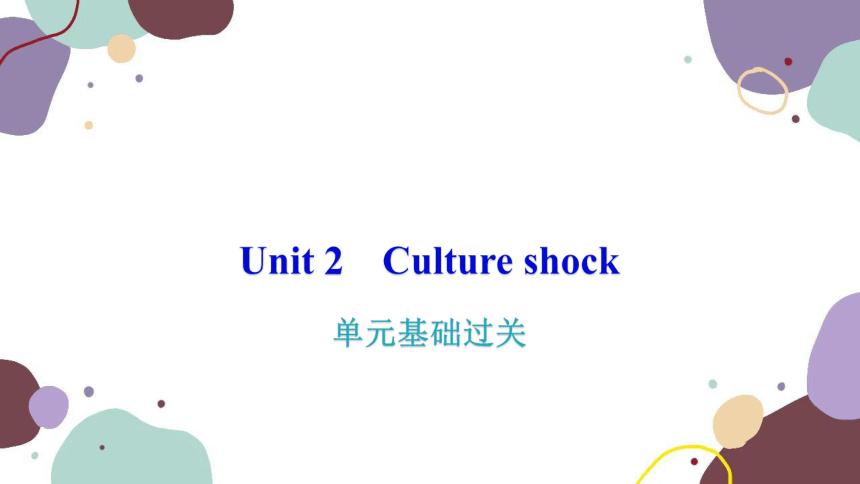 | |
| 格式 | pptx | ||
| 文件大小 | 239.5KB | ||
| 资源类型 | 教案 | ||
| 版本资源 | 牛津深圳版 | ||
| 科目 | 英语 | ||
| 更新时间 | 2023-08-04 08:44:40 | ||
图片预览

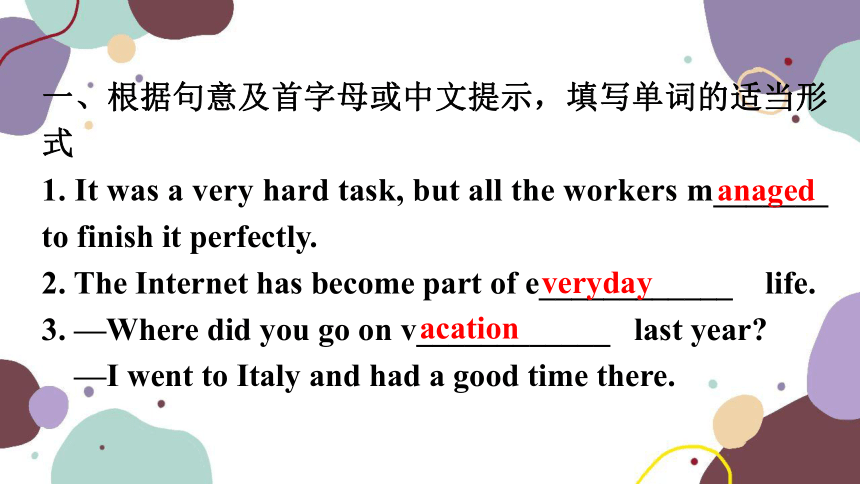
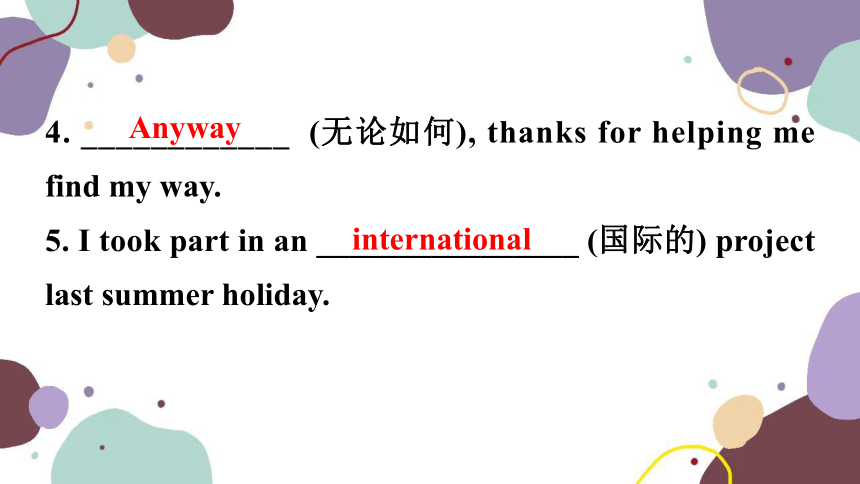
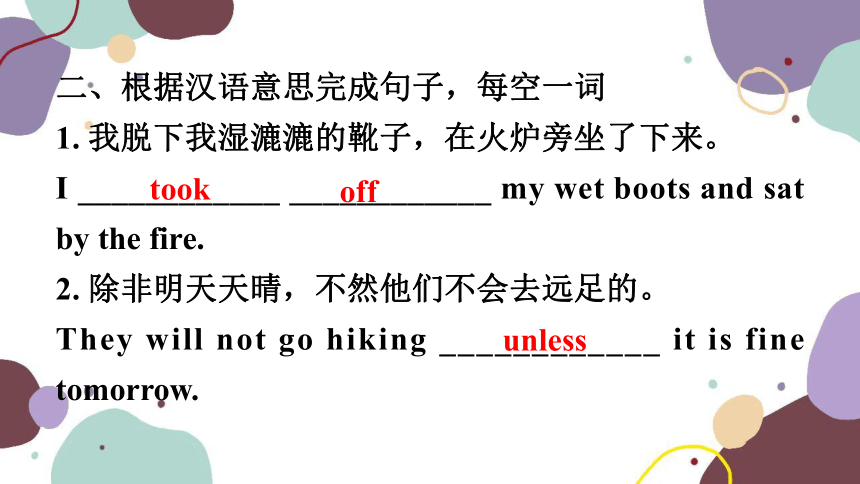
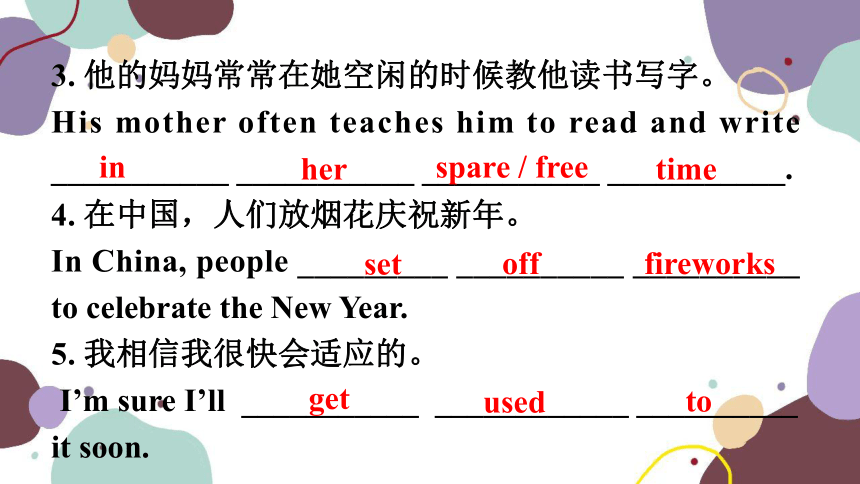
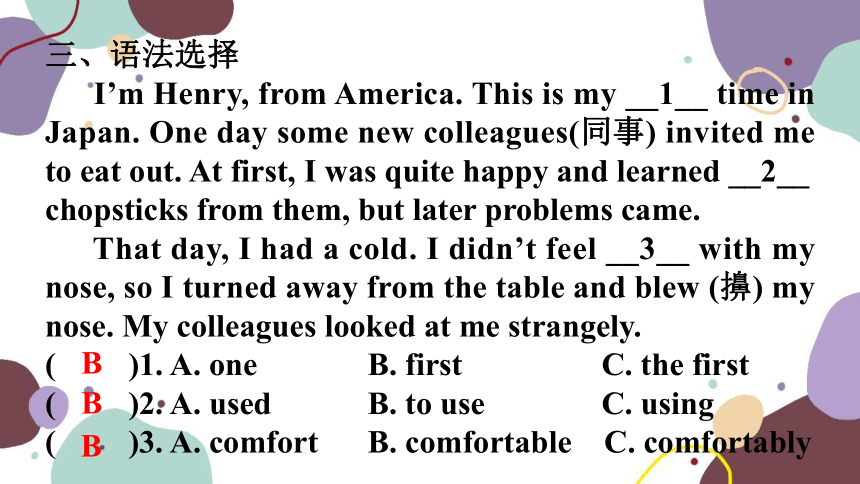
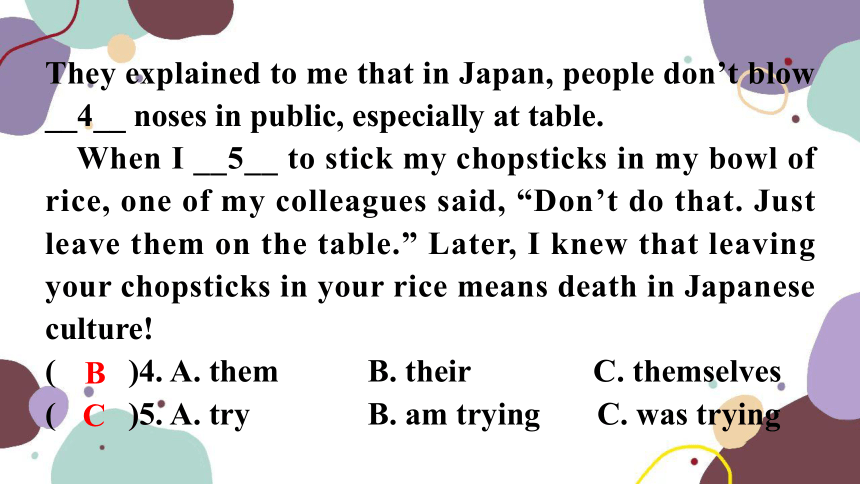
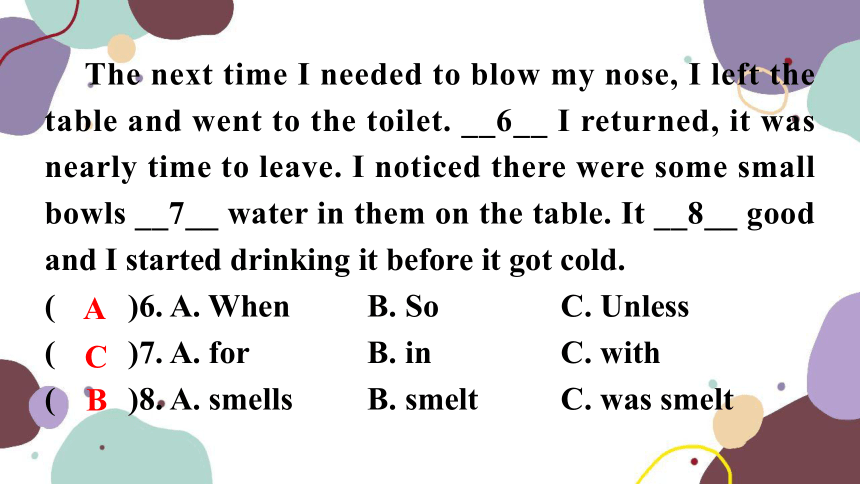
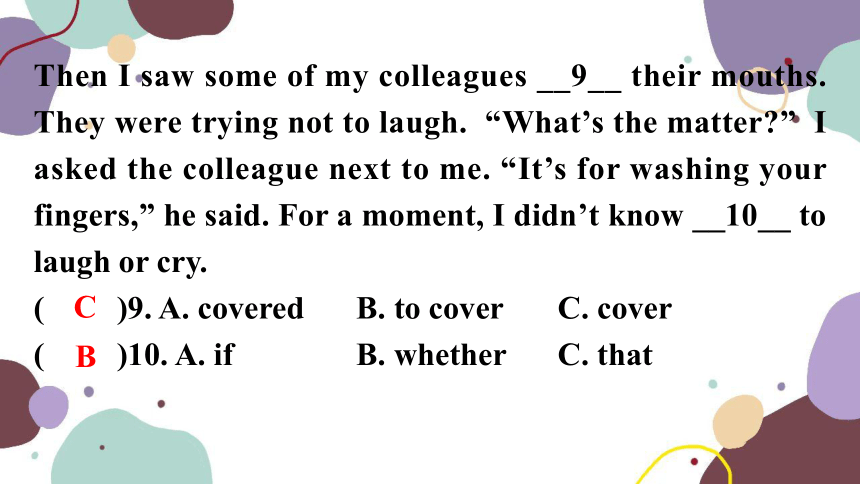
文档简介
(共27张PPT)
Unit 2 Culture shock
单元基础过关
一、根据句意及首字母或中文提示,填写单词的适当形式
1. It was a very hard task, but all the workers m_______ to finish it perfectly.
2. The Internet has become part of e____________ life.
3. —Where did you go on v____________ last year
—I went to Italy and had a good time there.
anaged
veryday
acation
4. ____________ (无论如何), thanks for helping me find my way.
5. I took part in an ________________ (国际的) project last summer holiday.
Anyway
international
二、根据汉语意思完成句子,每空一词
1. 我脱下我湿漉漉的靴子,在火炉旁坐了下来。
I ____________ ____________ my wet boots and sat by the fire.
2. 除非明天天晴,不然他们不会去远足的。
They will not go hiking ____________ it is fine tomorrow.
took
off
unless
3. 他的妈妈常常在她空闲的时候教他读书写字。
His mother often teaches him to read and write ___________ ___________ ___________ ___________.
4. 在中国,人们放烟花庆祝新年。
In China, people _________ __________ __________ to celebrate the New Year.
5. 我相信我很快会适应的。
I’m sure I’ll ___________ ____________ __________ it soon.
in
her
spare / free
time
set
off
fireworks
get
used
to
三、语法选择
I’m Henry, from America. This is my __1__ time in Japan. One day some new colleagues(同事) invited me to eat out. At first, I was quite happy and learned __2__ chopsticks from them, but later problems came.
That day, I had a cold. I didn’t feel __3__ with my nose, so I turned away from the table and blew (擤) my nose. My colleagues looked at me strangely.
( )1. A. one B. first C. the first
( )2. A. used B. to use C. using
( )3. A. comfort B. comfortable C. comfortably
B
B
B
They explained to me that in Japan, people don’t blow __4__ noses in public, especially at table.
When I __5__ to stick my chopsticks in my bowl of rice, one of my colleagues said, “Don’t do that. Just leave them on the table.” Later, I knew that leaving your chopsticks in your rice means death in Japanese culture!
( )4. A. them B. their C. themselves
( )5. A. try B. am trying C. was trying
B
C
The next time I needed to blow my nose, I left the table and went to the toilet. __6__ I returned, it was nearly time to leave. I noticed there were some small bowls __7__ water in them on the table. It __8__ good and I started drinking it before it got cold.
( )6. A. When B. So C. Unless
( )7. A. for B. in C. with
( )8. A. smells B. smelt C. was smelt
A
C
B
Then I saw some of my colleagues __9__ their mouths. They were trying not to laugh. “What’s the matter ” I asked the colleague next to me. “It’s for washing your fingers,” he said. For a moment, I didn’t know __10__ to laugh or cry.
( )9. A. covered B. to cover C. cover
( )10. A. if B. whether C. that
C
B
四、完形填空
Have you learned about table manners in China?Here I will __1__ some. It is a traditional custom for Chinese people to eat with chopsticks. Each person at table will have a pair of chopsticks, and there is also an extra pair which is for __2__ use.
( )1. A. treat B. manage
C. destroy D. introduce
( )2. A. public B. personal
C. useful D. healthy
D
A
You should remember that you’re __3__ to let the elders in the family sit and eat first. If they don’t start, everyone else shouldn’t start, either. And then you should make a toast (敬酒) to them __4__.
( )3. A. allowed B. considered
C. supposed D. invited
( )4. A. crazily B. terribly
C. strangely D. politely
C
D
While eating, it is very rude to eat with a loud __5__.And you’d better not speak while food is still in your __6__.Do not only eat one dish even if that is your favourite.
People usually go out of their way to cook delicious food to make you __7__ at home.
( )5. A. voice B. smile C. noise D. cry
( )6. A. plate B. mouth C. hand D. bowl
( )7. A. feel B. arrive C. eat D. sit
C
B
A
Sometimes they may say, “The dishes aren’t delicious. I __8__ you don’t mind.” At that time, you must not say, “Yeah, that’s __9__, but I don’t mind.”__10__, it is a typical word which can show one of Chinese qualities—modest (谦虚). You should answer, “Really?I don’t think so. It is the best taste of any dish that is new to me.”
( )8. A. realize B. suggest C. expect D. believe
( )9. A. perfect B. wrong C. true D. shameful
( )10. A. Correctly B. Actually C. Instead D. Finally
C
C
B
五、阅读理解(B篇)
Boris, a foreign student in China, often shares his experiences of Chinese culture on his vlog.
In one video, Boris shared how he had learned the Chinese word dongxi. He told people all marketplaces in ancient Chinese cities were set up along a single road that ran from east to west. So when you would say qu mai dongxi, you’d be saying, “I’m going to buy things.”
Some other videos show he is reading Chinese poems and performing kung fu in Chinese traditional costume(服装), which are quite welcome among his 40,000 followers.
“Many of my followers are learning Chinese,” Boris said. “But they know little about China.”
Like many foreigners, Boris once believed all Chinese could perform kung fu, flying onto roofs and walking over walls. But after he came to China, he found China had changed. That’s why he started to shoot vlogs to share Chinese culture.
Boris has posted more than 40 Chinese culture vlogs. But making these vlogs is not easy. Take reading the poem Second Farewell to Cambridge as an example. “I can understand and read the poem,” Boris said. “But to touch readers, I need to use proper feelings.” So he needed to look for much background information.
Though shooting these vlogs takes lots of time, the young man feels proud that his vlogs have inspired many people. Boris said that he wanted to continue bridging the differences between two cultures.
( )1. What does Boris mainly want to do through the vlogs
A. He wants to teach foreigners Chinese.
B. He wants to introduce a Chinese university.
C. He wants to sell Chinese products.
D. He wants to share his experiences in China.
D
( )2. How did Boris learn the Chinese word dongxi
A. By translating it as a whole.
B. By knowing its cultural background.
C. By making up some sentences.
D. By comparing it with similar words.
( )3. How many followers does Boris have
A. Forty. B. Four hundred.
C. Four thousand. D. Forty thousand.
B
D
( )4. Why is the poem Second Farewell to Cambridge mentioned
A. To meet the followers’ needs.
B. To express Boris’ love for poems.
C. To show Boris’ efforts at vlog-making.
D. To give an example of Chinese culture.
C
( )5. The passage is probably written to ________.
A. praise Boris’ actions
B. tell the facts about making vlogs
C. attract more visitors to China
D. introduce Chinese culture
A
【拓展练习】再次阅读文章,回答下列5个问题,并把答案写在横线上。
1. What does Boris wear while reading Chinese poems and performing kung fu
_______________________________________________
_______________________________________________
2. What are many of Boris’ followers learning
_______________________________________________
_______________________________________________
Boris / He wears Chinese traditional costume. / Chinese traditional costume.
Many of Boris’ followers / They are learning Chinese. / Chinese.
3. How is making vlogs, easy or difficult
_______________________________________________
4. How many Chinese culture vlogs has Boris posted
_______________________________________________
_______________________________________________
5. What did Boris want to continue
_______________________________________________
_______________________________________________
Making vlogs / It is difficult.
Boris / He has posted more than forty / 40 Chinese culture vlogs. / Forty / 40.
Boris / He wanted to continue bridging the differences between two cultures.
六、短文填空
I’ve studied in France for a year. While being on my year abroad, I have tried__1__ small things such as train tickets, postcards, and I have been taking lots of photos. Living in France, I __2__ the metro (地铁) every day. I have my own personalized map. On the __3__, I have circled all of my favourite restaurants, cafes, parks and other places. I have even coloured it to
collecting
take
map
say __4__ these places have free Wi-Fi or lunch deals. What I plan to do with all these things is making a scrapbook.
For those of you who have never heard of the word “scrapbook”, it is an empty book and people usually take it with __5__ on holidays. They fill it __6__ “scraps”of paper, tickets, maps, stamps, photos and so on. It is like a memory book. It is really valuable to own it. My scrapbook started __7__ September and after eight months it was almost full!
if / whether
them
with
in
__8__ not create a scrapbook of your time while travelling Isn’t it nice to be able to open a book of your life and time as a __9__ You can’t imagine how happy you can be by just looking at __10__ old ticket with a special date on. It is the little things that can make you smile happily.
Why
traveller
the
1. __________________ 2. __________________
3. __________________ 4. __________________
5. __________________ 6. __________________
7. __________________ 8. __________________
9. __________________ 10. __________________
collecting
take
map
if / whether
them
with
in
Why
traveller
the
THANKS!
Unit 2 Culture shock
单元基础过关
一、根据句意及首字母或中文提示,填写单词的适当形式
1. It was a very hard task, but all the workers m_______ to finish it perfectly.
2. The Internet has become part of e____________ life.
3. —Where did you go on v____________ last year
—I went to Italy and had a good time there.
anaged
veryday
acation
4. ____________ (无论如何), thanks for helping me find my way.
5. I took part in an ________________ (国际的) project last summer holiday.
Anyway
international
二、根据汉语意思完成句子,每空一词
1. 我脱下我湿漉漉的靴子,在火炉旁坐了下来。
I ____________ ____________ my wet boots and sat by the fire.
2. 除非明天天晴,不然他们不会去远足的。
They will not go hiking ____________ it is fine tomorrow.
took
off
unless
3. 他的妈妈常常在她空闲的时候教他读书写字。
His mother often teaches him to read and write ___________ ___________ ___________ ___________.
4. 在中国,人们放烟花庆祝新年。
In China, people _________ __________ __________ to celebrate the New Year.
5. 我相信我很快会适应的。
I’m sure I’ll ___________ ____________ __________ it soon.
in
her
spare / free
time
set
off
fireworks
get
used
to
三、语法选择
I’m Henry, from America. This is my __1__ time in Japan. One day some new colleagues(同事) invited me to eat out. At first, I was quite happy and learned __2__ chopsticks from them, but later problems came.
That day, I had a cold. I didn’t feel __3__ with my nose, so I turned away from the table and blew (擤) my nose. My colleagues looked at me strangely.
( )1. A. one B. first C. the first
( )2. A. used B. to use C. using
( )3. A. comfort B. comfortable C. comfortably
B
B
B
They explained to me that in Japan, people don’t blow __4__ noses in public, especially at table.
When I __5__ to stick my chopsticks in my bowl of rice, one of my colleagues said, “Don’t do that. Just leave them on the table.” Later, I knew that leaving your chopsticks in your rice means death in Japanese culture!
( )4. A. them B. their C. themselves
( )5. A. try B. am trying C. was trying
B
C
The next time I needed to blow my nose, I left the table and went to the toilet. __6__ I returned, it was nearly time to leave. I noticed there were some small bowls __7__ water in them on the table. It __8__ good and I started drinking it before it got cold.
( )6. A. When B. So C. Unless
( )7. A. for B. in C. with
( )8. A. smells B. smelt C. was smelt
A
C
B
Then I saw some of my colleagues __9__ their mouths. They were trying not to laugh. “What’s the matter ” I asked the colleague next to me. “It’s for washing your fingers,” he said. For a moment, I didn’t know __10__ to laugh or cry.
( )9. A. covered B. to cover C. cover
( )10. A. if B. whether C. that
C
B
四、完形填空
Have you learned about table manners in China?Here I will __1__ some. It is a traditional custom for Chinese people to eat with chopsticks. Each person at table will have a pair of chopsticks, and there is also an extra pair which is for __2__ use.
( )1. A. treat B. manage
C. destroy D. introduce
( )2. A. public B. personal
C. useful D. healthy
D
A
You should remember that you’re __3__ to let the elders in the family sit and eat first. If they don’t start, everyone else shouldn’t start, either. And then you should make a toast (敬酒) to them __4__.
( )3. A. allowed B. considered
C. supposed D. invited
( )4. A. crazily B. terribly
C. strangely D. politely
C
D
While eating, it is very rude to eat with a loud __5__.And you’d better not speak while food is still in your __6__.Do not only eat one dish even if that is your favourite.
People usually go out of their way to cook delicious food to make you __7__ at home.
( )5. A. voice B. smile C. noise D. cry
( )6. A. plate B. mouth C. hand D. bowl
( )7. A. feel B. arrive C. eat D. sit
C
B
A
Sometimes they may say, “The dishes aren’t delicious. I __8__ you don’t mind.” At that time, you must not say, “Yeah, that’s __9__, but I don’t mind.”__10__, it is a typical word which can show one of Chinese qualities—modest (谦虚). You should answer, “Really?I don’t think so. It is the best taste of any dish that is new to me.”
( )8. A. realize B. suggest C. expect D. believe
( )9. A. perfect B. wrong C. true D. shameful
( )10. A. Correctly B. Actually C. Instead D. Finally
C
C
B
五、阅读理解(B篇)
Boris, a foreign student in China, often shares his experiences of Chinese culture on his vlog.
In one video, Boris shared how he had learned the Chinese word dongxi. He told people all marketplaces in ancient Chinese cities were set up along a single road that ran from east to west. So when you would say qu mai dongxi, you’d be saying, “I’m going to buy things.”
Some other videos show he is reading Chinese poems and performing kung fu in Chinese traditional costume(服装), which are quite welcome among his 40,000 followers.
“Many of my followers are learning Chinese,” Boris said. “But they know little about China.”
Like many foreigners, Boris once believed all Chinese could perform kung fu, flying onto roofs and walking over walls. But after he came to China, he found China had changed. That’s why he started to shoot vlogs to share Chinese culture.
Boris has posted more than 40 Chinese culture vlogs. But making these vlogs is not easy. Take reading the poem Second Farewell to Cambridge as an example. “I can understand and read the poem,” Boris said. “But to touch readers, I need to use proper feelings.” So he needed to look for much background information.
Though shooting these vlogs takes lots of time, the young man feels proud that his vlogs have inspired many people. Boris said that he wanted to continue bridging the differences between two cultures.
( )1. What does Boris mainly want to do through the vlogs
A. He wants to teach foreigners Chinese.
B. He wants to introduce a Chinese university.
C. He wants to sell Chinese products.
D. He wants to share his experiences in China.
D
( )2. How did Boris learn the Chinese word dongxi
A. By translating it as a whole.
B. By knowing its cultural background.
C. By making up some sentences.
D. By comparing it with similar words.
( )3. How many followers does Boris have
A. Forty. B. Four hundred.
C. Four thousand. D. Forty thousand.
B
D
( )4. Why is the poem Second Farewell to Cambridge mentioned
A. To meet the followers’ needs.
B. To express Boris’ love for poems.
C. To show Boris’ efforts at vlog-making.
D. To give an example of Chinese culture.
C
( )5. The passage is probably written to ________.
A. praise Boris’ actions
B. tell the facts about making vlogs
C. attract more visitors to China
D. introduce Chinese culture
A
【拓展练习】再次阅读文章,回答下列5个问题,并把答案写在横线上。
1. What does Boris wear while reading Chinese poems and performing kung fu
_______________________________________________
_______________________________________________
2. What are many of Boris’ followers learning
_______________________________________________
_______________________________________________
Boris / He wears Chinese traditional costume. / Chinese traditional costume.
Many of Boris’ followers / They are learning Chinese. / Chinese.
3. How is making vlogs, easy or difficult
_______________________________________________
4. How many Chinese culture vlogs has Boris posted
_______________________________________________
_______________________________________________
5. What did Boris want to continue
_______________________________________________
_______________________________________________
Making vlogs / It is difficult.
Boris / He has posted more than forty / 40 Chinese culture vlogs. / Forty / 40.
Boris / He wanted to continue bridging the differences between two cultures.
六、短文填空
I’ve studied in France for a year. While being on my year abroad, I have tried__1__ small things such as train tickets, postcards, and I have been taking lots of photos. Living in France, I __2__ the metro (地铁) every day. I have my own personalized map. On the __3__, I have circled all of my favourite restaurants, cafes, parks and other places. I have even coloured it to
collecting
take
map
say __4__ these places have free Wi-Fi or lunch deals. What I plan to do with all these things is making a scrapbook.
For those of you who have never heard of the word “scrapbook”, it is an empty book and people usually take it with __5__ on holidays. They fill it __6__ “scraps”of paper, tickets, maps, stamps, photos and so on. It is like a memory book. It is really valuable to own it. My scrapbook started __7__ September and after eight months it was almost full!
if / whether
them
with
in
__8__ not create a scrapbook of your time while travelling Isn’t it nice to be able to open a book of your life and time as a __9__ You can’t imagine how happy you can be by just looking at __10__ old ticket with a special date on. It is the little things that can make you smile happily.
Why
traveller
the
1. __________________ 2. __________________
3. __________________ 4. __________________
5. __________________ 6. __________________
7. __________________ 8. __________________
9. __________________ 10. __________________
collecting
take
map
if / whether
them
with
in
Why
traveller
the
THANKS!
